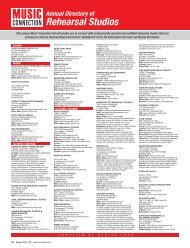CONTENTS
View/Download the new issue PDF here - Music Connection
View/Download the new issue PDF here - Music Connection
- No tags were found...
You also want an ePaper? Increase the reach of your titles
YUMPU automatically turns print PDFs into web optimized ePapers that Google loves.
– ERIC HARABADIAN<br />
William Shatner<br />
Bold Prog-Rock Collaborations With Stellar Cast<br />
William Shatner has not only been an enduring star of TV, stage<br />
and screen, but has boldly ventured into musical and spokenword<br />
territories. His first recording project, The Transformed<br />
Man (1968), featured amusing and somewhat campy recitations of Bob<br />
Dylan’s “Mr. Tambourine Man” and Lennon-McCartney’s “Lucy in the<br />
Sky with Diamonds.” In 1978 Shatner performed a similarly tongue-incheek<br />
rendition of Elton John’s<br />
“Rocket Man” at the Science<br />
Fiction Film Awards. This pop<br />
culture icon has also collaborated<br />
with keyboardist Ben Folds on the<br />
reflective album Has Been (2004)<br />
and recorded Seeking Major Tom<br />
in 2011.<br />
Shatner’s latest album, for<br />
Cleopatra Records, is called<br />
Ponder the Mystery and it is<br />
his first foray into the world of<br />
progressive rock. The music was<br />
written and co-produced by Yes<br />
and Circa multi-instrumentalists<br />
Billy Sherwood and Tony Kaye. By<br />
Shatner’s own estimation, it is one<br />
of his most personal and creative<br />
works to date. The artists that<br />
signed on to appear on the record<br />
are a who’s who of classic prog,<br />
rock, fusion and even country.<br />
Mick Jones, Steve Vai, Al DiMeola,<br />
Rick Wakeman, Robbie Krieger,<br />
Vince Gill, Edgar Froese, Edgar<br />
Winter and George Duke are just a<br />
few of the contributors.<br />
Music Connection: Can you talk<br />
about the origin of this project? How<br />
did you arrive at the storyline? It<br />
seems very personal.<br />
Shatner: When the label asked me<br />
to do it and they asked me what<br />
would I do, I sort of flashed on a<br />
concept where I imagined a man<br />
on a beach in despair. And through<br />
the process of twilight and sunset<br />
and the evening, the night and the<br />
sounds of the night, he gets his joy<br />
of life back. And from that one-line<br />
scenario I was able to hang my<br />
hook on certain songs that apply to<br />
that—despair, feeling down and out,<br />
sunset, the colors of sunset, how<br />
they affect life. And then the sounds<br />
of the night and finally a joyful song<br />
in which he gets his mojo back.<br />
MC: Did you feel progressive rock was the<br />
best vehicle for your statement?<br />
Shatner: Well, I wish I could say that I<br />
consciously went to progressive rock. But,<br />
in fact, it seems my natural tendency is to<br />
be in a genre that could be characterized<br />
as progressive rock. I’ve likened<br />
progressive rock music to science fiction—the exploration of boundaries<br />
to go in new directions and try to discover, I suppose, things that are<br />
already there and bring them out. That’s what I think science fiction does<br />
and that’s what I’m beginning to see that progressive rock music does.<br />
MC: That makes a lot of sense. Just the nature of it being progressive<br />
allows you to go wherever you wanna go with it.<br />
Shatner: Well, exactly! And this being a concept album, if you will, it<br />
harkens back to the great history of concept albums.<br />
MC: That’s something that’s been lost in modern music. We’d like to<br />
see that trend come back.<br />
Shatner: You wanna sit down and listen to this whole album. There’s a<br />
progression here. This is music that has a beginning, middle and end.<br />
“I’ve likened progressive rock<br />
music to science fiction — the<br />
exploration of boundaries…”<br />
MC: Can you talk about the writing process for this album? Did you sit<br />
down in sessions with Billy Sherwood and Tony Kaye?<br />
Shatner: No. I sat down and wrote what I thought was a song and,<br />
essentially, poetry. I tried to give it some depth so that there are echoes<br />
in the songs of other meanings. If you look at the words carefully, there<br />
are undertones of other meanings of life and death and that kind of<br />
thing. And then I presented them<br />
to Billy, who then made them into<br />
a song both in cutting and pasting,<br />
if you will, the lyrics and writing the<br />
melodies and arrangements. So<br />
he is truly the genius behind this.<br />
MC: That’s very gracious of you<br />
to say.<br />
Shatner: Well, it’s fact! In many<br />
cases the words are good. In some<br />
cases I’d love to have some of them<br />
back and rework them. But he has<br />
made these songs just lovely and I<br />
am very proud of this album.<br />
MC: What were you were listening<br />
to in preparation for this record?<br />
Shatner: I’d like to say I played<br />
The Wall or something like that.<br />
But I listen to a lot of music. I<br />
love music of all kinds. But I<br />
don’t know individuals! I hear<br />
something but I couldn’t tell you<br />
who I listened to until someone<br />
tells me about it. But I don’t<br />
know…I’m not conversant, as I’m<br />
not with actors. I don’t know who’s<br />
on these shows. The leading<br />
actors I know, but I’m not up on<br />
the names or reputations.<br />
MC: Is there a vocal regimen you<br />
use before a recording session?<br />
Shatner: No. I’m very busy and<br />
so I’m constantly saying words<br />
in front of people or in front of<br />
a microphone. You wanna be<br />
careful that you’re not selfconscious<br />
about your voice. So<br />
many people who use their voice<br />
for their living become conscious<br />
of their voice rather than the<br />
intention of what their saying—<br />
whether it’s music or dramatic—<br />
so you’ve gotta be careful of that<br />
as well. But head tones, chest<br />
tones, I know about those things<br />
and I’m aware of them.<br />
MC: What would you like audiences to<br />
get from Ponder the Mystery?<br />
Shatner: I want them to be entertained<br />
and moved emotionally so that<br />
they wanna come back to the next<br />
performance. My hope is that it’s that<br />
kind of music and that kind of mystique that people will say, “I’ve gotta<br />
go back and hear that again.”<br />
MC: What music artists would you like to work with in the future?<br />
Shatner: I’d like to work with anybody that’s considered great in music.<br />
For that matter I’d like to work with anybody great in any field. I’m so<br />
curious about what makes somebody great and where their talents lie. I<br />
would love to work with anybody who’s talented in anything.<br />
MC: Finally, do you have any other musical projects planned right now?<br />
Shatner: No. Let me see how this one goes and then, if I’m asked,<br />
we’ll tackle something else.<br />
Contact Billy James, glassonyonpr@gmail.com<br />
November 2013 musicconnection.com 45
















